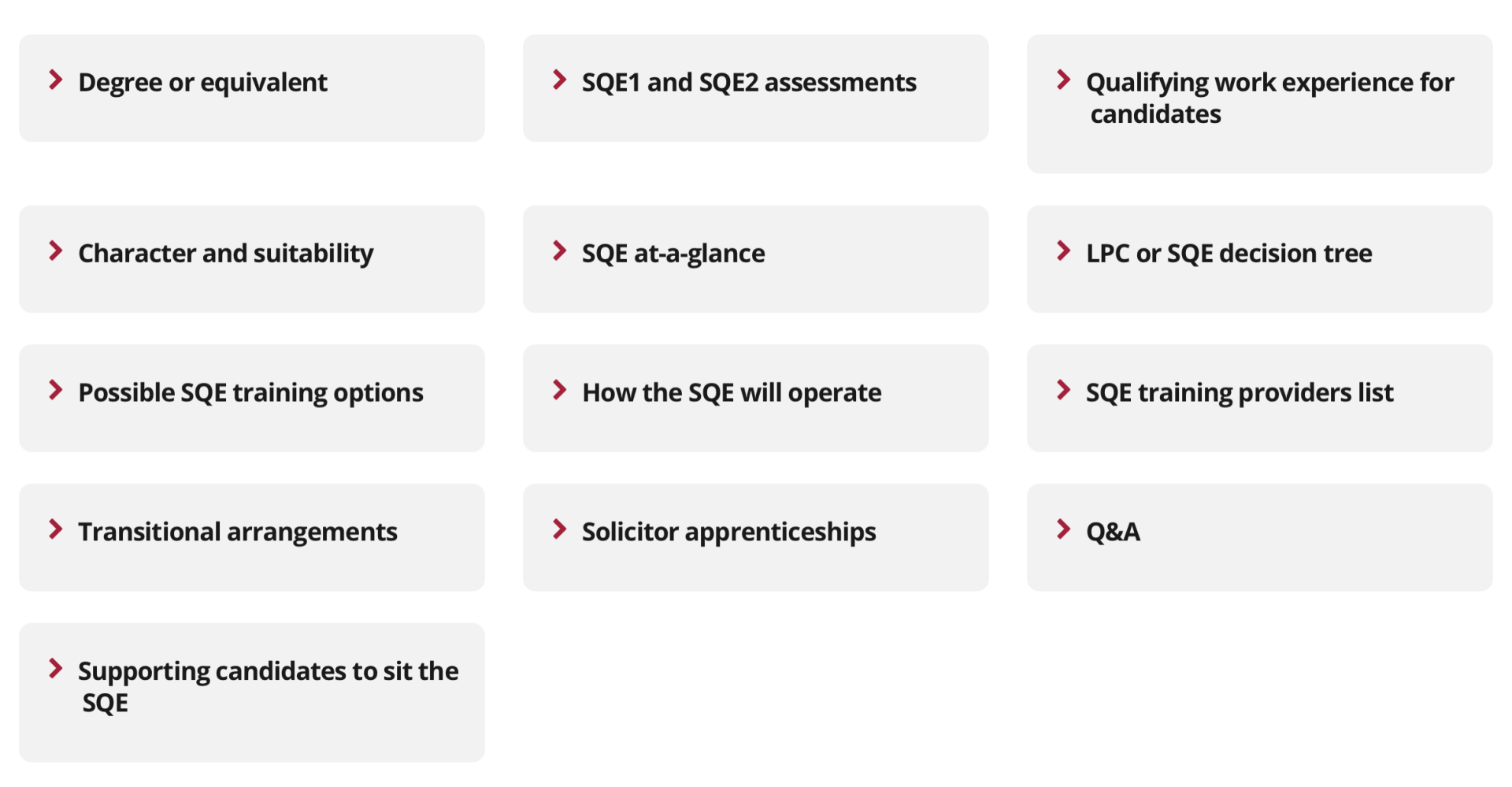2021: year of the Solicitors Qualifying Examination
Crispin Passmore • February 1, 2021
Where we are and what it means

As we start 2021 many lawyers and firms are really starting to think about what the new Solicitor Qualifying Examination means for them and their business. My sense is that some firms look at this defensively – how can we adapt what we do now to comply with SQE – whereas some others are looking more positively about what the opportunities are that it presents and how those opportunities fit with the businesses’ strategic objectives.
I blogged before about the need for law firms to engage early
and for law firm leaders to think about strategy
rather than just getting people through SQE. It still isn’t too late to think radically, and I want to talk about what opportunities SQE might offer different market segments. But first let’s refresh ourselves on what SQE is and what it entails.
There are four elements to qualifying as a solicitor under the new regime:
- A degree or equivalent (such as equivalent qualification or apprenticeship or substantial work experience)
- Pass both stages of SQE assessment (focusing respectively on functioning legal knowledge and practical legal skills)
- Have two years full time (or equivalent) qualifying work experience
- Pass the SRA’s character and suitability requirements
You can find out more about the four elements on the SRA’s website where the SQE resources
are excellent (screenshot above). There is no need for me to go into the detail here: I encourage readers to go straight to the source and spend some time reading each of the sections. I hear so many myths about SQE that I am amazed that the perpetrators are able to qualify as solicitors, give legal advice or run a law firm!
The key thing about SQE is that it provides flexibility to all parties. Other than the requirement to sit SQE1 before SQE2 there are very few restrictions on how the four elements are put together. While many candidates will go through a somewhat familiar degree/SQE1/period of qualifying work/SQE2 route, it is possible to design very different routes that fit different businesses and how they work.
Firms are already responding differently – and that is partly the attraction of SQE. City firms and those that follow may not take up SQE fully until 2022. The more imaginative legal businesses that have been disrupting for twenty years may move more quickly.
Before we dig into the impact on different legal market segments perhaps it is worth exploring what happens to the current key elements of qualifying as a solicitor.
The law degree has never really been uniform despite the core elements that make up the qualifying conditions being prescribed. Institutions cater for different cohorts of students, teach differently and offer different course modules. Perhaps half of solicitors don’t do a law degree as their first degree so the current law degree is already less significant than the idea of a qualifying law degree might suggest. SQE gives some freedom to universities to go further in their catering to different intakes. London South Bank University
says that it will offer post graduate courses to prepare for SQE1 and even SQE2, but others may integrate SQE1 into their undergraduate degree. Other law schools may just ignore SQE and focus on developing the intellectual reasoning and critical thinking that underpins professional elites. There are many other models available to universities with greater use of sandwich years and practical experience throughout the degree. My sense is that it is hard to design and redesign law degrees so it will take time for change to happen, but it has already started. The emergence of more online degrees, such as that offered by Arden University, suggests more opportunities to combine the degree element with paralegal work experience.
Overtime I expect the Legal Practice Course to disappear. It is evolving into something akin to SQE2 preparation for the big law firms, but I suspect that over the next five years it will shrink further, as firms realise how much can be learned by ‘doing’ in the workplace and this can be most effectively consolidated via online training that is heavily personalised by the deployment of artificial intelligence in educator’s systems. Educators may try to tell law city law firms that SQE is ‘not enough’ for their sophisticated practices, but I suspect that firms will see through that within a couple of years. A revised or adapted LPC will not be part of the route to qualify for many of the law firms and legal business that are thinking most positively about SQE. I suspect that they will look for a more flexible, modularised and tailored resource more quickly to supplement on the job training and experience.
Perhaps we will see some innovative educators offer a ‘freemium’ service with their core teaching and materials online free of charge and income generated from added value services such as tailored learning programmes, practice assessments and marking, personalised feedback and more. That might not work for the city firms that currently drive the shape of legal education, but it could be hugely beneficial to small firms, new entrant alternative providers and the thousands of frustrated law graduates that haven’t been able to find a law firm to sponsor them through the current stages.
The most exciting flexibility comes from the changes to qualifying work experience. Instead of a formal training contract where it is existing market players that decide on aggregate how many new solicitors there will be, we will have an environment where aspiring solicitors simply need to gain relevant work experience in a wider range of environments and less formality. Working in a university law clinic might be a core part of a bricks and mortar law school, as might a year in business as part of a four-year degree. A paralegal might get their two years’ experience and study for SQE alongside that through study leave or in the evenings. And some firms will continue to recruit for what looks much the same as the current training contract. The opportunities are almost endless and that is where more forward-thinking legal businesses are starting their planning from.
Not many of the alternative legal service providers have trained their own lawyers over the last twenty years. That might well change now. With offices full of paralegals in England and Northern Ireland, with foreign lawyers and paralegals in Poland, India or South Africa that want to be English solicitors and with a pressure from clients to have more solicitors in their workforce, these legal businesses should see SQE as core to their workforce development and business strategy.
Rather than losing paralegals to any offer of a training contract from a law firm, they can offer them all a route to qualification that is tailored to their specific needs. It is not too difficult to design reward and remuneration packages that incentivise qualification without losing control of costs. And with some imagination this can be integrated into post qualification plan that incentivises the newly qualified solicitors to stay with these providers for longer.
These businesses can supervise their paralegals with a mix of direct solicitor supervision and smart systems that allow a more remote supervision. And they can focus more on getting the culture right in their workforce rather than trying to identify solicitors trained at city firms that have the right values and behaviours to switch to a very different model. It is of course cheaper to develop your own talent than to buy it in ready-made. The opportunity for these new entrants to work with some of the more imaginative, vocationally focused educators such as Barbri, College of Legal Practice
and Arden, as well as many of the post-1992 universities. Combining work experience and learning reduces risk and costs for students and employers alike.
Similar opportunities exist for small law firms or legal aid firms and not for profits. The shift online and ability to tailor courses and personalise training means that firms could combine to shape education to fit their particular market segment. LAPG
could work, just for example, with the College of Legal Practice and Barbri to design a social welfare law focused route to qualification. That would probably be a better investment for the Legal Education Foundation
than a handful of funded training contracts that probably don’t really shift the overall level of supply.
City firms might learn from others and see that their onshore centres and their global offices are packed full of future England & Wales solicitors. Rather than dangle a training contract to them, or even worse tell paralegals that there is no route to being a solicitor with the firm, city firms are increasingly recognising the talent they already have in their paralegal hordes. SQE might just be the vehicle that helps them harness that talent. Traditional trainees may look down their noses at solicitors from this route their SQE scores may well tell another story - just as solicitor apprentices have blown many away with their quality and fast development. I predict that demand from foreign lawyers and students for SQE will drive the SRA to offer examinations, initially for SQE1 but eventually for SQE2 as well, far beyond our borders.
In house leaders will start to see new opportunities too. They are already working extraordinarily closely with alternative providers – you can find in house lawyers working alongside lawyers and paralegals from alternative providers. Integrated training programmes offered by alternative providers will bind them closer together and create a new cohort of lawyers that seamlessly switch between in house and alternative provision. Something similar might happen where city firms work alongside alternative providers. Breaking down barriers through training improves culture and collaboration.
Multidisciplinary practices might go even further. I can imagine a future where accountants, management consultants, and lawyers share core training within multidisciplinary practices. Many of the behaviours and skills are the same and the relationships and cross-profession collaboration skills that are developed at the start of careers are likely to impact on how lawyers work later on. The days of lawyer exceptionalism are disappearing.
The firms that grasp the opportunities that SQE offers will have a strategic advantage. They will be able to shape a workforce development strategy that supports their business objectives. It would be a mistake to simply ask HR or graduate recruitment teams to adjust their current programmes to fit SQE. As a leader it is better to lift your head, look to the horizon and plan a route to success than it is to look at your feet to stop you tripping over the most immeditae bump in the road. Seeing opportunity is the foundation of most success.

The Legal Tech Fund ran the best event for innovators int he legal market that I have found. TLTF 2023 was a a great opportunity to learn new things but best of all were the connections made and friends seen. These enabled new discussions and deeper debates about technology, capital deployment and liberalisation. TLTF 2024 is just one year away - I'm already excited.









